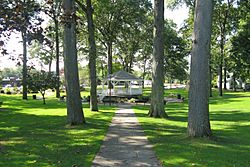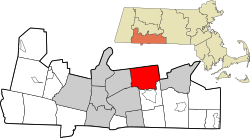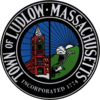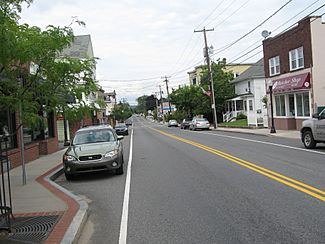Ludlow, Massachusetts facts for kids
Quick facts for kids
Ludlow, Massachusetts
|
|||
|---|---|---|---|

Ludlow Town Green
|
|||
|
|||
| Nickname(s):
Soccer City, The Bubble, Mini Portugal, Jute Town (archaic)
|
|||

Location in Hampden County in Massachusetts
|
|||
| Country | United States | ||
| State | Massachusetts | ||
| County | Hampden | ||
| Settled | 1751 | ||
| District | March 29, 1774 | ||
| Incorporation | August 23, 1775 | ||
| Government | |||
| • Type | Representative town meeting | ||
| Area | |||
| • Total | 28.2 sq mi (73.1 km2) | ||
| • Land | 27.2 sq mi (70.3 km2) | ||
| • Water | 1.1 sq mi (2.8 km2) | ||
| Elevation | 550 ft (168 m) | ||
| Population
(2020)
|
|||
| • Total | 21,002 | ||
| • Density | 772.1/sq mi (298.7/km2) | ||
| Time zone | UTC-5 (Eastern) | ||
| • Summer (DST) | UTC-4 (Eastern) | ||
| ZIP Code |
01056
|
||
| Area code(s) | 413 | ||
| FIPS code | 25-37175 | ||
| GNIS feature ID | 0618187 | ||
| Website | http://www.ludlow.ma.us/ | ||
Ludlow is a town in Hampden County, Massachusetts, United States. It's part of the Springfield area. In 2020, about 21,002 people lived here. Ludlow is known for its large and lively Portuguese and Polish communities. It's also sometimes called "Soccer City" because soccer is super popular here!
Contents
History of Ludlow
The first people to live near the Chicopee River, including where Ludlow is today, spoke the Algonquian language. These were likely the Nipmuc or Pocomtuc tribes. During King Philip’s War (1675–1676), British settlers fought with Indigenous people. One story tells of a group, led by Roaring Thunder, who jumped into the Chicopee River to escape. This spot is now called Indian Leap.
Early Settlement and Naming
British settlers first arrived in Ludlow in 1751. It was originally called Stony Hill Parish. The town was officially renamed Ludlow and became a separate town in 1774. This happened just before the American Revolution began.
For a long time, Ludlow was mostly a farming town. Many street names today, like Chapin Street and Miller Street, come from these early farming families. Ludlow also had many sawmills and gristmills. These mills used the power of nearby rivers and brooks like the Chicopee River.
Before the American Civil War, Ludlow started to become a "mill town." This means it had many factories, especially for making things like glass bottles. The governor of the Massachusetts Bay Colony, Thomas Hutchinson, changed the town's name from Stony Hill to Ludlow. The town might have been named after Roger Ludlow, who helped start the Connecticut Colony, or after a town called Ludlow in England.
The Ludlow Company and Growth
In 1868, a very large factory called the Ludlow Company opened. This company made jute yarns, twine, and webbing. The Ludlow Company helped shape the town by building homes, a library, schools, and playgrounds for its many workers. The Ludlow Clock Tower on the town seal shows how important this company was. Later, in the 20th century, this company moved to India.
In the early 1900s, Ludlow grew from a mill town into a "streetcar suburb" of Springfield, Massachusetts. This meant people could easily travel to Springfield by trolley. Ludlow also had two railroads. One of these, the Springfield, Athol, and Northeastern Railroad, had a station in Ludlow. This station was the last stop from Boston before it closed in the 1950s.
Modern Development
In 1950s, Ludlow's population grew a lot. This was partly because Interstate 90, also known as the Massachusetts Turnpike, was built. A local politician, John F. Thompson, helped get an exit for Ludlow on the Turnpike. This made it easier for people to live in Ludlow and work in Springfield. Since then, many new neighborhoods have been built, helping Ludlow continue to grow.
Geography of Ludlow
Ludlow covers about 28.2 square miles (73.1 square kilometers). Most of this area is land, with about 1.1 square miles (2.8 square kilometers) being water.
Ludlow shares its borders with several other towns:
- To the west: Chicopee
- To the north: Granby
- To the northeast: Belchertown
- To the east: Palmer
- To the south: Wilbraham
- To the southwest: Springfield
Population and People
| Historical population | ||
|---|---|---|
| Year | Pop. | ±% |
| 1790 | 560 | — |
| 1850 | 1,186 | +111.8% |
| 1860 | 1,174 | −1.0% |
| 1870 | 1,136 | −3.2% |
| 1880 | 1,526 | +34.3% |
| 1890 | 1,939 | +27.1% |
| 1900 | 3,536 | +82.4% |
| 1910 | 4,948 | +39.9% |
| 1920 | 7,470 | +51.0% |
| 1930 | 8,876 | +18.8% |
| 1940 | 8,181 | −7.8% |
| 1950 | 8,660 | +5.9% |
| 1960 | 13,805 | +59.4% |
| 1970 | 17,580 | +27.3% |
| 1980 | 18,150 | +3.2% |
| 1990 | 18,820 | +3.7% |
| 2000 | 21,209 | +12.7% |
| 2010 | 21,103 | −0.5% |
| 2020 | 21,002 | −0.5% |
| 2022* | 20,871 | −0.6% |
| * = population estimate. Source: United States Census records and Population Estimates Program data. |
||
In 2000, there were 21,209 people living in Ludlow. The town has a diverse population. Many people in Ludlow are of Portuguese, Polish, and French Canadian descent. About 21% of the town's population is Portuguese-American.
Culture and Sports
Ludlow has a rich culture, especially influenced by its large Portuguese community. The Portuguese church, Our Lady of Fatima, holds an annual "Festa." This festival is a very important cultural event for Portuguese-Americans across the country.
Soccer City
Soccer is an incredibly popular sport in Ludlow. The town's high school soccer team is one of the best in Western Massachusetts. It has even been ranked among the top 20 high school programs in the nation! The team has won many state championships, including one in 2018.
Ludlow is also home to professional soccer teams. The Western Mass Pioneers and Western Mass Lady Pioneers play their home games at Lusitano Stadium in Ludlow. Because of its strong soccer history, the National Soccer Hall of Fame added Ludlow to its soccer display in 1996.
Education in Ludlow
Ludlow has several public schools for students of all ages.
Public Schools
- Elementary Schools: East Street School and Harris Brook Elementary School. Younger students (preschool, kindergarten, and first grade) go to East Street. Older elementary students (grades 2-5) attend Harris Brook.
- Middle School: Paul R. Baird Middle School.
- High School: Ludlow High School is the town's only public high school.
Other Schools and Colleges
- Private School: St. John the Baptist is a private school for grades K-8.
- Vocational High School: The nearest vocational high school, which teaches job skills, is Pathfinder High School in Palmer.
- Colleges: For higher education, nearby options include Springfield Technical Community College and Holyoke Community College. Larger universities like the University of Massachusetts Amherst and Westfield State University are also close by. Several private colleges are in Springfield, such as Western New England University and Springfield College.
Transportation
Ludlow is easy to reach by car, located at exit 54 on Interstate 90, also known as the Massachusetts Turnpike. State Highway 21 connects Ludlow to Springfield and Belchertown.
For those who prefer public transport, there are local bus routes that connect Ludlow to Springfield. The nearest major airports are Bradley International Airport (about 23 miles away) and Logan International Airport in Boston (about 77 miles away).
Past Railroads
Ludlow once had a train station and was part of a railroad line called the Springfield, Athol and North-eastern Railroad. This line connected to Boston and New York. The train station in Ludlow was the last stop from Boston until it closed in 1960. Another railroad, called the Hampden Bypass, was started in the 1910s but was never finished. Parts of its path were later used to build the Massachusetts Turnpike.
Notable People from Ludlow
Many interesting people have come from Ludlow, including:
- Chester W. Chapin (1798–1883), a successful businessman and a state representative.
- Nicole Fiorentino (born 1979), the bass guitarist for the famous band Smashing Pumpkins.
- Gabriel Gonzaga (born 1979), a professional UFC fighter.
- Dean Lombardi (born 1958), a former general manager for NHL hockey teams like the Los Angeles Kings.
- Tom Matera (born 1981), a World Wrestling Entertainment star known as Antonio Thomas.
- William D. Mullins (1931–1986), a state representative and baseball player.
- Mike Mushok (born 1970), the guitarist from the rock band Staind.
- Gretchen Palmer (born 1961), an actress.
- Fred Pereira (born 1954), a professional soccer player.
- Elisha K. Root (1808–1865), an inventor and industrialist.
- John F. Thompson (1920–1965), a state representative who served as House Speaker.
Images for kids
See also
 In Spanish: Ludlow (Massachusetts) para niños
In Spanish: Ludlow (Massachusetts) para niños
 | Chris Smalls |
 | Fred Hampton |
 | Ralph Abernathy |





